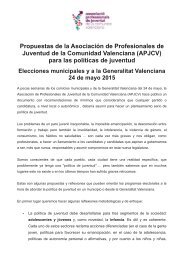c39dc
c39dc
c39dc
You also want an ePaper? Increase the reach of your titles
YUMPU automatically turns print PDFs into web optimized ePapers that Google loves.
FOREWORD<br />
As our workplaces change under the twin impulses of globalization and<br />
technological progress, so do the skills required by employers. To help young<br />
people keep up with these changing requirements, the European Commission<br />
has been working on issues surrounding skills and their acquisition.<br />
Formal education aside, it is increasingly evident that non-formal and informal<br />
learning, for example through volunteering or participation in youth<br />
organisations, play a key role in providing young people with so-called "soft"<br />
skills which are highly valued and appreciated by prospective<br />
employers. These skills include the capacity for teamwork and for<br />
communicating effectively, coupled with a well-developed sense of initiative<br />
and self-confidence.<br />
It is in my view essential that this experience is adequately recognised. My<br />
proposal for a Council Recommendation on the validation of non-formal and<br />
informal learning indicates concrete ways to improve formal recognition of<br />
youth work and other non-formal learning opportunities.<br />
The importance of this type of learning is confirmed by empirical evidence<br />
from the Youth in Action programme: 75% of European Voluntary Service<br />
participants say that the experience has improved their employment<br />
prospects.<br />
This study commissioned by the European Youth Forum is a valuable addition<br />
to this growing body of evidence and I am sure it will prove an important<br />
contribution to the debate.<br />
Commissioner Androulla Vassiliou<br />
European Commissioner for Education, Culture, Multilingualism and Youth.<br />
5




